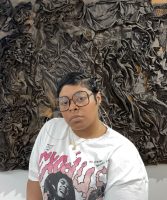CAA News Today
Michael Aurbach Fellow Announced!
posted by CAA — March 04, 2024
Congratulations to this year’s recipient of the Michael Aurbach Fellowship for Excellence in Visual Art, Sara Torgison!
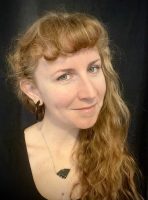
Sara Torgison is an interdisciplinary artist working in ceramic, fiber, and found materials. Her work builds into and extends finite and fragile surfaces to emphasize and inhabit marginal spaces. Strange alliances formed in passages between hard and soft substances are resonant of the shifts inherent in navigating public and private life and the distance between self and other. The action of configuring bridges in transitional zones draws upon traditions of mending and maintenance as a continuous collaborative process.
Sara received an MFA from the University of Cincinnati Department of Design, Architecture, Art and Planning, and a BFA from the California Polytechnic University, Humboldt. Sara is currently Visiting Ceramics Faculty at Miami University of Ohio, and works as a preparator at the Contemporary Arts Center in Cincinnati. She has participated in various artist residencies and workshops, including Penland School of Craft’s winter residency for which she was awarded a distinguished fellowship in 2024. Sara was a 2023 Ohio Arts Council Creative Excellence Grant recipient. Her work is widely exhibited and collected throughout the United States.
HONORABLE MENTIONS

Alex Lukas was born in Boston, MA. With a wide range of influences, Lukas’s practice is focused on the intersections of place and human activity, narrative, history, and invention. His fieldwork, research, and production reframes the monumental and the incidental through intricate publication series, sculptures, drawings, prints, videos, and audio collages. Lukas’s work has been exhibited nationally and internationally, and is included in the collections of the Pennsylvania Academy of the Fine Arts, the Kadist Foundation, the Philadelphia Museum of Art, the San Francisco Museum of Art library, the New York Public Library, and the library of the Museum of Modern Art, New York. Lukas has been awarded residencies at the Bemis Center for the Arts, the Ucross Foundation, the Center for Land Use Interpretation, the Fountainhead, and the John Michael Kohler Arts Center’s Arts/Industry program, among others. He graduated with a BFA from the Rhode Island School of Design in 2003, and received an MFA from Carnegie Mellon University in 2018. Lukas is currently an Assistant Professor of Print and Publication in the Department of Art at the University of California, Santa Barbara, and organizer of CA53776V2.gallery, an experimental exhibition platform on the dashboard of a 2007 Ford Ranger.
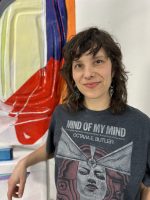
Kristy Hughes is a sculptor, painter, and educator. She received her MFA from Indiana University and her MA and BA from Eastern Illinois University. Hughes was awarded a 2022–23 Visual Arts Fellowship at the Fine Arts Work Center in Provincetown, MA, and has held residencies at the ChaNorth Artist Residency, Hambidge Center for Creative Arts and Sciences, Liquitex Residency at Residency Unlimited, the Studios at MASS MoCA, and a full fellowship at the Vermont Studio Center. Recent solo and group exhibitions include: the Sculpture Center in Cleveland, OH; Provincetown Art Association and Museum, Provincetown, MA; ChaShaMa, New York; Hudson D. Walker Gallery, Provincetown, MA; Soft Times Gallery, San Francisco, CA; Wassaic Project, Wassaic, NY, in addition to exhibitions at universities in North Carolina and South Carolina. Her work has been featured most recently in Maake magazine, New American Paintings, Friend of the Artist, Create magazine, and Vast magazine. Hughes is a full-time lecturer at the University of Vermont in Burlington, VT, where she teaches sculpture, painting, and drawing.
CAA Board President’s Open Letter to North American College and University Presidents
posted by CAA — February 09, 2024
On behalf of the College Art Association (CAA) and its Advocacy Committee, I write in support of an open letter from the Middle East Studies Association (MESA) written on December 18, 2023. As a partner learned society under the American Council of Learned Societies (ACLS), we urge you to uphold and protect academic and creative freedom on your campuses.
Since October 2023, we have seen a surge in threats to faculty, students, and college staff. The current Gaza-Israel conflict has generated widespread academic and scholastic debate; we call upon you during this difficult time to protect free speech and to defend academic freedom for all campus community members. We also urge you to refrain from censoring artist exhibitions in your campus galleries and museums.
CAA honors diversity and reflects an extraordinary range of cultures, perspectives, education, and experiences that make the advancement of art and design integral to our global constituencies and to culture at large.
CAA is committed to ensuring academic freedom and freedom of artistic expression and exhibition. We agree with MESA that “free speech is essential for any democratic polity, and this country’s institutions of higher education should be places in which even the most controversial and unpopular views can be expressed, debated and criticized. At the same time, all students deserve equal access to education, free from harassment and discrimination. Unfortunately, we are witnessing a dramatic increase in antisemitic, anti-Palestinian, anti-Arab and anti-Muslim harassment and discrimination on our campuses.”
As university leaders, you bear responsibility during charged political times to safeguard academic freedom, freedom of expression and artistic practice, as well as the physical welfare of all members of your community. We urge you to protect students, faculty, and staff and honor their right to freedom of speech without fear of intimidation, harassment, or retaliation.
Sincerely,

Jennifer Rissler, PhD
President, Board of Directors
CAA | Advancing Art and Design
caa.reviews Seeks Two Editorial Board Members and Field Editors in Seven Areas
posted by CAA — February 08, 2024
caa.reviews seeks two new Editorial Board Members to each serve a four-year term, July 1, 2024–June 30, 2028.
CAA encourages applications from candidates with a strong record of scholarship who are committed to the imaginative development of caa.reviews. An online, open-access journal, caa.reviews is devoted to the peer review of recent books, museum exhibitions, and projects relevant to the fields of art history, visual studies, and the arts.
The Editorial Board advises the Editor-in-Chief, guides Field Editors in their process of identifying books, exhibitions, and review authors suitable for the journal, and proposes new initiatives for the journal’s editorial programs. Editorial Board Members stay abreast of trends and issues in the field by attending and reporting on sessions at the CAA Annual Conference, as well as other academic conferences, symposia, and events in their fields.
The caa.reviews Editorial Board meets three times a year, twice in the spring and fall and once at the Annual Conference each February. Meetings in the spring and fall are currently held by videoconference, while the February meeting typically occurs in person. Members of all editorial boards at CAA volunteer their services without compensation or financial support for travel to and accommodations at the Annual Conference
Candidates must be current CAA members and should not currently serve on the editorial board of a competing journal or another CAA editorial board or committee. Nominations and self-nominations are welcome. Nominators should ascertain their nominee’s willingness to serve before submitting a letter of nomination. Please email a letter of nomination or self-nomination, describing your nominee’s interest in and qualifications for appointment, the nominee’s CV, and contact information to Eugenia Bell, Editorial Director, ebell@collegeart.org. Please include the subject line caa.reviews Editorial Board Member.
Deadline: Monday, May 6.
CAA is also inviting nominations and self-nominations for individuals to join the caa.reviews Council of Field Editors for a three-year term July 1, 2024–June 30, 2027 (renewable once). An online, open-access journal, caa.reviews is devoted to the peer review of new books, museum exhibitions, and projects relevant to art history, visual studies, and the arts. Candidates may be artists, art historians, art critics, art educators, curators, or other art professionals with stature in the field and with experience writing or editing books and/or exhibition reviews; institutional affiliation is not required.
CAA is searching for Field Editors in the following fields:
- Art of the Ancient Mediterranean, Europe, and West Asia
- Latin American Art
- Photography
- Art of the Ancient Americas
- Exhibitions: Southeast
- Exhibitions: Southwest
- African Art
Working with the caa.reviews Editor-in-Chief, the caa.reviews Editorial Board, and CAA’s staff editor, each Field Editor selects content to be reviewed, commissions reviewers, and considers manuscripts for publication. Field Editors for books are expected to keep abreast of newly published and important books and related media in their fields of expertise, and those for exhibitions should be aware of current and upcoming exhibitions (and other related projects) in their geographic regions.
The Council of Field Editors meets once a year in February at the CAA Annual Conference. Members of all CAA committees and editorial boards volunteer their services without compensation or financial support for travel to and accommodations at the Annual Conference.
Candidates must be current CAA members and should not be serving on the editorial board of a competing journal or another CAA editorial board or committee. Nominations and self-nominations are welcome. Nominators should ascertain their nominee’s willingness to serve before submitting a letter of nomination. Please email a letter of nomination or self-nomination describing your nominee’s interest in and qualifications for appointment, the nominee’s CV, and contact information to Eugenia Bell, Editorial Director, ebell@collegeart.org. Please include the subject line caa.reviews Field Editor.
Deadline: Monday, May 6.
CAA 2023 Professional Development Fellows Announced
posted by CAA — February 05, 2024
Congratulations to our 2023 Professional Development fellows, Zoe Weldon-Yochim, University of California, Santa Cruz (Art History) and Kelly Tapia-Chuning, Cranbrook Academy of Art (Visual Art)!
Honorable Mentions: Jocelyn E. Marshall, Emerson College (Art History); Breanna Reiss, University of New Mexico (Art History); Jessica Monette, Stanford University (Visual Art).
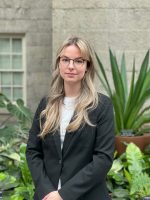
Zoe Weldon-Yochim is a PhD Candidate in Visual Studies at the University of California, Santa Cruz, whose areas of specialization include the art and visual culture of the United States, global contemporary art, and the theories and methods associated with ecocriticism. Her research involves attending to how various artists grapple with the difficulties of visuality and environmental injustices, particularly the long-term and often invisible slow violence of US militarism, nuclear toxicities, and extraction. Her dissertation, “Atomic Afterlives: Visualizing Nuclear Toxicity in Art of the United States, 1979–2011,” focuses on a selection of underrepresented American artists whose work, stemming from genealogies of research-based conceptual art and documentary practices, brings nuclear histories and concerns into aesthetic form in singular, conflictual, and shared ways. In this project, Weldon-Yochim examines how diverse visual approaches—such as installation, photography, print media, and painting—mediate, represent, and give agency to the nuclear and its atomic afterlives. Her research illuminates burgeoning artistic conceptualizations of the intersection of militarism and environmentalism during and beyond the last decade of the Cold War, where particular women, Indigenous, and Asian American artists mobilized varying visual grammar to consider the interconnectedness of environmental injustices and an ever-expanding US military system. Weldon-Yochim’s work has been supported by the American Council of Learned Societies and the Henry Luce Foundation, the Smithsonian American Art Museum, the Center for Advanced Study in the Visual Arts, and numerous university grants.
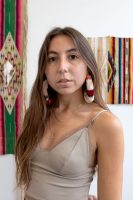
Kelly Tapia-Chuning is a mixed-race Chicana artist of Indigenous descent from southern Utah who is currently based in Detroit. Tapia-Chuning’s work forms as a response to her family’s histories of assimilation, questioning power dynamics attached to representation, racial identity, and language. Tapia-Chuning utilizes research, textile deconstruction, and needle-felting to convey the dichotomy of being nepantla, born in-between spaces and cultures.
In 2020, she received a BFA in Studio Arts from Southern Utah University and is pursuing an MFA in Fiber at Cranbrook Academy of Art, where she was awarded a Gilbert Fellowship. Tapia-Chuning’s work has been included in exhibitions at the Utah Museum of Contemporary Art, GAVLAK (Los Angeles), Onna House (East Hampton, NY), The Border Project Space (NY), and solo exhibitions with Red Arrow Gallery (Nashville, TN) and Harsh Collective (NY). She has been an artist in residence at Stove Works (Chattanooga, TN), and Zion National Park, in Utah. Tapia-Chuning’s work is in numerous public and private collections across the US.
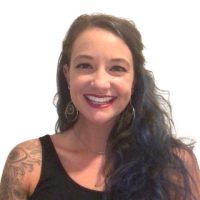
Jocelyn E. Marshall is faculty in the Departments of Visual & Media Arts and Writing, Literature, & Publishing at Emerson College. She previously was a Dissertation Scholar at Brandeis University’s Women’s Studies Research Center. Their interdisciplinary projects focus on contemporary US-based diasporic women and LGBTQ+ artists and writers, researching relationships between historical trauma and queer and feminist activism. Her work has appeared or is forthcoming in the Journal of American Culture, Women & Performance: A Journal of Feminist Theory, Public Art Dialogue, and elsewhere. In 2022, they co-edited Trauma-Informed Pedagogy: Addressing Gender-Based Violence in the Classroom, and in 2023 edited a multimedia issue of Rutgers University’s Rejoinder journal, themed Textual-Sexual-Spiritual: Artistic Practice and Other Rituals as Queer Becoming and Beyond. She also curates contemporary art exhibitions, including Being In-Between | In-Between Being (2020–21) and Creativity in the Time of Covid-19 (2023). She currently co-chairs the Gender & Feminisms Caucus at the Society for Cinema & Media Studies and is a contributing editor at Art Journal Open for the Feminist Interview Project.
Dr. Marshall’s research has been supported by, among other institutions, the Mark Diamond Research Foundation, J. Burton Harter Foundation, and New York Public Library. Her first book project draws from interviews and archival research to connect select US-based Asian and Latinx diasporic women artists as an underexamined cohort in feminist art history, contextualizing their aesthetic and poetic interventions as coterminous with shifts in US trauma studies and feminist theory. A portion of this project received Honorable Mention for the 2022 National Women’s Studies Association-Feminist Formations Paper Award.
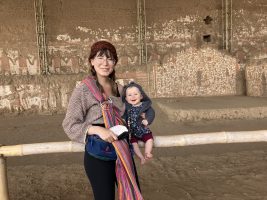 Breanna Reiss is a PhD candidate at the University of New Mexico who studies pre-Hispanic ceramics, primarily from coastal Ecuador and northern Peru, with a focus on their iconography and elements of their composition. She also received her MA from UNM where, in partnership with the Earth and Planetary Sciences Department, she examined the chemical composition of rare blue and blue-green post-fire ceramic figurine colorants from Ecuador. Her dissertation explores ancient Moche plant motifs, relating them to identifiable species and exploring their contextual relationships to narrative scenes. This plantcentric approach has identified several biomes and ecological indicators important to Moche culture. Along with teaching introductory art history courses, she has received numerous fellowships with UNM’s Center for Southwest Research and the Digital Initiatives and Scholarly Communication Department, and currently works for Georgia Tech Research Institute.
Breanna Reiss is a PhD candidate at the University of New Mexico who studies pre-Hispanic ceramics, primarily from coastal Ecuador and northern Peru, with a focus on their iconography and elements of their composition. She also received her MA from UNM where, in partnership with the Earth and Planetary Sciences Department, she examined the chemical composition of rare blue and blue-green post-fire ceramic figurine colorants from Ecuador. Her dissertation explores ancient Moche plant motifs, relating them to identifiable species and exploring their contextual relationships to narrative scenes. This plantcentric approach has identified several biomes and ecological indicators important to Moche culture. Along with teaching introductory art history courses, she has received numerous fellowships with UNM’s Center for Southwest Research and the Digital Initiatives and Scholarly Communication Department, and currently works for Georgia Tech Research Institute.
Jessica Monette is an interdisciplinary artist living in the Bay Area whose creative endeavors span the diverse realms of painting, sculpture, installation, and collage. Materiality forms the core of Monette’s artistic expression, each chosen element serving as a deliberate conduit for context and personal narrative. Her repertoire includes a wide array of materials—from house paint, plaster, and thin-set mortar to found and fabricated objects, site-specific soil, rope, nails, cotton, railroad spikes, water from the Mississippi River, and clothing collected from various family members. To New Orleans–born Monette, these materials aren’t just art components, her materials are agents for rebuilding and storytelling. The cataclysmic events of Hurricane Katrina in 2005 undergird her work and serve as a potent visual metaphor for contemporary colonial sediment, encapsulating a temporal lens that reveals the nuances of systemic oppressions. Economic inequality, gentrification, unequal aid distribution, environmental racism, forced migration, and the erosion of cultural heritage—Katrina becomes a concentrated manifestation of these issues.
Monette’s reconstruction of her familial archive, challenges systems of oppression that are created to perpetuate silence. The threads of her narrative, woven together through materials and thematic exploration, contribute to a powerful dialogue that invites viewers to reexamine the need for persistence of cultural memory and the tenacity of the human spirit.
Learn more about CAA Professional Development Fellowships here.
Millard Meiss Publication Fund: Apply Now + Congrats To Fall 2023 Grantees!
posted by CAA — January 22, 2024
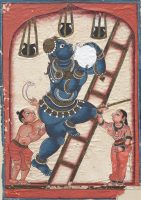
Krishna Stealing Curds, late 1700s, Andhra Pradesh, Tirupati. Gum tempera and gold on paper, 10 ⅞ x 7 ⅝ in. (27.7 x 19.3 cm). The Cleveland Museum of Art, John L. Severance Fund 1966.28
CAA is now accepting applications for the Millard Meiss Publication Fund. Twice yearly, grants are awarded through this fund to support book-length scholarly manuscripts in art history, visual studies, and related subjects which have been accepted by a publisher on their merits but cannot be published in the most desirable form without a subsidy. Thanks to the generous bequest of late Professor Millard Meiss, CAA has been awarding these grants since 1975.
Visit our website to learn more about the application process, criteria, and to apply.
Deadline: March 15, 2024
Congratulations to the Meiss Fall 2023 Grantees!
Joanna Fiduccia: Figures of Crisis: Alberto Giacometti and the Myths of Nationalism, Yale University Press
Mayu Fujikawa: Envisioning Diplomacy: Images of Japanese Ambassadors in Early Modern Europe, Penn State University Press
Kelly Presutti: Land into Landscape: Art, Environment, and the Making of Modern France, Yale University Press
Paula Richman: The Work of Art: India’s Mithila Painting, University of Washington Press
Anna Seastrand: Body, History, and Myth: Early Modern Murals in South India, Princeton University Press
Alicia Volk: In the Shadow of Empire: Art in Occupied Japan, University of Chicago Press
AC2024 Edwards Memorial Support Grant Recipients Announced
posted by CAA — January 12, 2024
The CAA Edwards Memorial Support Grants, in memory of Archibald Cason Edwards Sr. and Sarah Stanley Gordon Edwards and made possible by Mary D. Edwards, support women who are emerging scholars and have received their PhD within the past two years or who are nearing the end of a doctoral program. Congratulations to the Annual Conference 2024 recipients, Daniella Berman and Phillippa Pitts!

Daniella Berman, Independent Scholar
Presentation: Revolution as Natural Disaster: Re-Framing 1789
Session: Disaster! Trouble in Eighteenth-Century Art
Presentation Abstract:
In Auguste Desperret’s lithograph, a volcano erupts the word LIBERTÉ. Lava cascades down, threatening to encircle successive cityscapes (representing countries at risk, identified by their flags) and sending figures – many in military uniform – running in the midground. In the foreground, the ruins of a castle bear the date 1789, surrounded by stone fragments inscribed with abandoned values including diving rights and feudalism. The sky is peppered with boulders bearing the words julliet, in reference to the July 1830 revolution.
Produced in 1833 for the satirical publication La Caricature, Desperret’s print Troisième eruption du volcan de 1789, reframes the impacts of the French Revolution as a natural disaster. In so doing, it draws on tropes prevalent in eighteenth-century dialogues inspired by Voltaire among others, that positioned the Revolution as a rupture, oftentimes violent, akin to natural phenomena. However, Desperret’s print calls into question how these natural disaster metaphors for the French Revolution and the St. Dominque revolt were utilized and transformed as the event was repeatedly reframed in the years following 1789 and well into the nineteenth century. What was the function of such analogies, and how were they visualized? This paper will explore the manifestations of Revolution as natural disaster across the material culture of the long eighteenth century, tracing the shifting dialogues that positioned the Revolution as a rupture or cyclical, as progress or failure, as upheaval or disruption, while considering the legacies of this rhetoric in the historiography of the Revolution and related visual material.
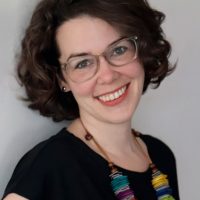
Phillippa Pitts, Boston University
Presentation: Fever Trees & Pharmacopeic Dreams: The Medical Manifest Destiny within Frederic Edwin Church’s Heart of the Andes
Session: U.S. Imperialism, Extraction, and Ecocritical Art Histories
Presentation Abstract:
Although often overlooked, the pursuit of health was central to the nineteenth-century ideas of empire that shaped both U.S. Americans’ imagined sphere of influence and the period’s enthusiasm for grand landscape painting. As the source of lifesaving cinchona, quinine, and diverse Peruvian elixirs, the Andes loomed particularly large in the antebellum imagination. Plays, panoramas, popular scientific texts, and patent medicine ads all cultivated popular interest in this supposed Edenic garden of health and abundance under perpetual threat of spectacular destruction by earthquakes and volcanoes. Taking Frederic Edwin Church’s The Heart of the Andes as its central case study, this paper recreates the conditions of vision in the antebellum city to reveal the underexamined pharmacopeic narratives within the painting and its dramatic performance. In doing so, it highlights how such displays of biodiverse abundance concealed the actual violence of botanical extraction. Indigenous and African laborers were, as one period observer noted, “made human sacrifices to furnish health to the white foreigners,” dying of disease as they carried the lifesaving treatments that would safeguard European and U.S. American imperial forces across the Global South. Today’s scholarly emphasis on the genocidal colonial excavation of Andean gold and silver has similarly elided the cultural, ecological, and human cost of extracting vegetable resources. Pairing insights from ecocriticism and critical disability studies, this paper argues for the importance of recognizing this medical Manifest Destiny, as well as artists’ role in naturalizing such discourse.
Art Journal / AJO Editorial Board seeks new members!
posted by CAA — January 08, 2024
CAA invites nominations and self-nominations for three individuals to serve on the Art Journal / AJO Editorial Board for a four-year term: July 1, 2024–June 30, 2028. Candidates may be artists, art historians, art critics, art educators, curators, or other art professionals; institutional affiliation is not required. Art Journal, published quarterly by CAA, is devoted to twentieth- and twenty-first-century art and visual culture. AJO is an online forum for the visual arts that presents artists’ projects, conversations and interviews, scholarly essays, and other forms of original content. Committed to fostering new intellectual exchanges in the fields of modern and contemporary art, AJO prioritizes material that makes meaningful use of the web and publishes on a rolling basis.
The editorial board advises the Art Journal and AJO editors-in-chief and assists them in identifying authors, articles, artists’ projects, and other content for the journal; performs peer review and recommends peer reviewers; guides the journals’ editorial programs and may propose new initiatives for them; promotes and advocates for both journals; and may support fundraising efforts on their behalf. Members also assist the editors-in-chief to keep abreast of trends and issues in the field by attending and reporting on sessions at the CAA Annual Conference and other academic conferences, symposia, exhibitions, and events.
The Art Journal / AJO Editorial Board meets three times a year, with meetings in the spring and fall plus one at the CAA Annual Conference in February. The fall and spring meetings are currently held remotely. Members are expected to pay travel and lodging expenses to attend the conference in February. Members of all editorial boards volunteer their services to CAA without compensation.
Candidates must be current CAA members in good standing and should not be serving on the editorial board of a competitive journal or on another CAA editorial board or committee. Members may not publish their own work in the journals during the term of service. CAA encourages applications from colleagues who will contribute to the diversity of perspectives on the Art Journal / AJO Editorial Board and who will engage actively with conversations about the discipline’s engagements with differences of culture, religion, nationality, race, gender, sexuality, and access. Nominators should ascertain their nominee’s willingness to serve before submitting a name; self-nominations are also welcome. Please email a letter of interest and a CV as a single PDF to Eugenia Bell, Editorial Director, ebell@collegeart.org.
Deadline: February 5, 2024
CAA 2024 Board of Directors Election: Vote Now!
posted by CAA — December 18, 2023
As a CAA member, voting is the best way to shape the future of your professional association. Thank you for taking the time to vote!
The CAA Board of Directors is comprised of professionals in the visual arts who are elected annually by the membership to serve four-year terms (or, in the case of Emerging Professional Board members, two-year terms). The Board is charged with the long-term financial stability and strategic direction of CAA; it is also the Association’s governing body. The board sets policy regarding all aspects of CAA activities, including publishing, the Annual Conference, awards and fellowships, advocacy, and committee procedures. For more information, please read the CAA By-laws on Nominations, Elections, and Appointments.
MEET THE CANDIDATES
The 2023–24 Nominating Committee has selected the following candidates for election to the CAA Board of Directors. Click the names of the candidates below to read their personal statements and CVs before casting your vote.
BOARD OF DIRECTOR CANDIDATES (FOUR-YEAR TERM, 2024–2028)

Assistant Professor of Art
Kentucky College of Art + Design (Louisville, KY)

Assistant Professor, Non-Western Art History, Art Program
California State University Channel Islands (Camarillo, CA)
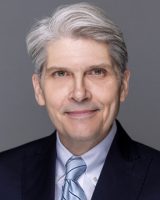
Fulbright Scholar (India)
Organizational Leadership Scholar, Columbia University (New York, NY)
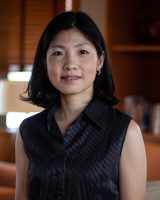
Associate Professor of Art History & Head of Arts & Humanities Major
Yale-NUS College (Singapore)
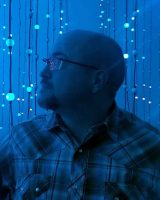
Assistant Professor of New Media Art
Northern Arizona University (Flagstaff, AZ)
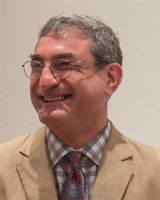
Head Librarian
Sotheby’s Institute of Art (New York, NY)
EMERGING PROFESSIONALS BOARD OF DIRECTOR CANDIDATES (TWO-YEAR TERM, 2024–2026)

PhD Candidate, Tyler School of Art and Architecture
Temple University (Philadelphia, PA)
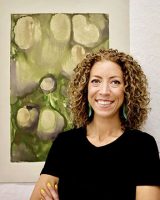
MFA Candidate
Boston University (Boston, MA)
CAA members must cast their votes online. The deadline for voting is 5 p.m. CT on Thursday, February 15, 2024.
The elected individuals will be announced at the CAA Annual Business Meeting to be held 1–2 p.m. CT on Friday, February 16, 2024.
Questions? Contact Maeghan Donohue, Chief of Staff and Director, Strategic Planning, Diversity & Governance.
AC2024 Annual Artist Interviews Announced: Dawoud Bey and Anne Wilson
posted by CAA — December 11, 2023
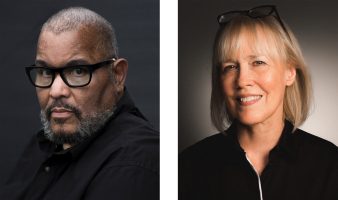
Dawoud Bey (photograph by Frank Ishman) and Anne Wilson (photograph by Joe Mazza)
CAA is thrilled to announce that Chicago-based artists Dawoud Bey and Anne Wilson will be the featured guests of the CAA 112th Annual Conference Annual Artist Interviews. Established in 1997, the Annual Artist Interviews, sponsored by the CAA Services to Artists Committee (SAC), remains the most highly anticipated event at the conference. This year, Bey will be interviewed by Elisabeth Sherman, Senior Curator and Director of Exhibitions and Collections, International Center of Photography, and Wilson will be interviewed by Elissa Auther, Deputy Director of Curatorial Affairs and the William and Mildred Lasdon Chief Curator, Museum of Arts and Design.
Dawoud Bey
Groundbreaking American artist and MacArthur Fellow, Dawoud Bey, is known for his evocative photographs and film works about communities that are often marginalized and for visualizing the oft disappeared histories of the Black presence in America. He began his career as a photographer in 1975 with a series of photographs, Harlem, USA, that was exhibited to critical acclaim in his first one-person exhibition at the Studio Museum in Harlem in 1979. His work has since been the subject of numerous exhibitions and retrospectives, including recently, Dawoud Bey: An American Project and Dawoud Bey and Carrie Mae Weems: In Dialogue, at museums and galleries worldwide, including the Art Institute of Chicago, the High Museum of Art, the National Gallery of Art, San Francisco Museum of Modern Art, the Getty Center, the Seattle Art Museum, the Museum of Fine Arts, Houston, the Walker Art Center, and the Whitney Museum of American Art.
His work has also been the subject of several monographs, including a forty-year retrospective monograph Seeing Deeply (University of Texas Press, 2017) and the recent Street Portraits (MACK Books, 2021). His critical writings on contemporary art and photography have appeared in a range of publications. Most recently, Elegy (Aperture, 2023) accompanies an exhibition at the Virginia Museum of Fine Arts and brings together the history projects and landscape-based work Bey has made since 2012.
Dawoud Bey received his MFA from Yale University School of Art and is currently Professor of Photography and a former Distinguished College Artist at Columbia College Chicago, where he has taught since 1998. He is represented by Sean Kelly Gallery, Stephen Daiter Gallery, and Rena Bransten Gallery.
Anne Wilson
Anne Wilson is a Chicago-based visual artist who creates sculpture, material drawings, and performances that explore themes of time, loss, and private and social rituals. Wilson’s artwork resides in permanent collections around the world, including the Metropolitan Museum of Art, Art Institute of Chicago, Museum of Contemporary Art, Chicago, Des Moines Art Center, Detroit Institute of Arts, Victoria & Albert Museum, London, Foundation Toms Pauli, Lausanne, Switzerland, and the 21st Century Museum of Contemporary Art, Kanazawa, Japan. Wilson was named a 2015 United States Artists Distinguished Fellow and is the recipient of awards from the Renwick Alliance, Textile Society of America, the Driehaus Foundation, Artadia, the Louis Comfort Tiffany Foundation, National Association of Schools of Art and Design, Cranbrook Academy of Art, the National Endowment for the Arts, and the Illinois Arts Council. She is represented by the Rhona Hoffman Gallery and Paul Kotula Projects. Wilson is a Professor Emeritus in the Department of Fiber and Material Studies at the School of the Art Institute of Chicago where she advises graduate students. Her upcoming project opens at the Museum of Arts and Design, NYC in 2024.
The AC2024 Annual Artist Interviews will be held on Friday, February 16, 4:30–7:00 p.m. CT at the Hilton Chicago. This event will also be livestreamed on YouTube.
Register now for the CAA 112th Annual Conference, February 14–17, 2024 in Chicago!
Notice of CAA 112th Annual Business Meeting
posted by CAA — December 11, 2023
CAA Annual Business Meeting
Friday, February 16, 2024
1 p.m. CT
The 112th Annual Business Meeting of the members of the College Art Association will be called to order at 1 p.m. CT on Friday, February 16, 2024, at the Hilton Chicago. Access to this meeting is included in paid registration and no-cost registration. CAA President, Jennifer Rissler, will preside.
Agenda
- Welcome + Call to Order – Jennifer Rissler, CAA President
- Executive Director Report – Meme Omogbai, CAA Executive Director + CEO
- Approval of 111th Annual Business Meeting Minutes [ACTION ITEM]
- Financial Report
- Old/New Business
- Board Member Election Results – Jennifer Rissler, CAA President
- Adjourn
Board Voting
along with an online voting form. Please submit your voting form for the 2024 election no later than 5 p.m. CT on Thursday, February 15th, 2024.
Next Meeting – 2025
The 113th Annual Business Meeting of the College Art Association will be held in February 2025, precise date and location to be announced.



